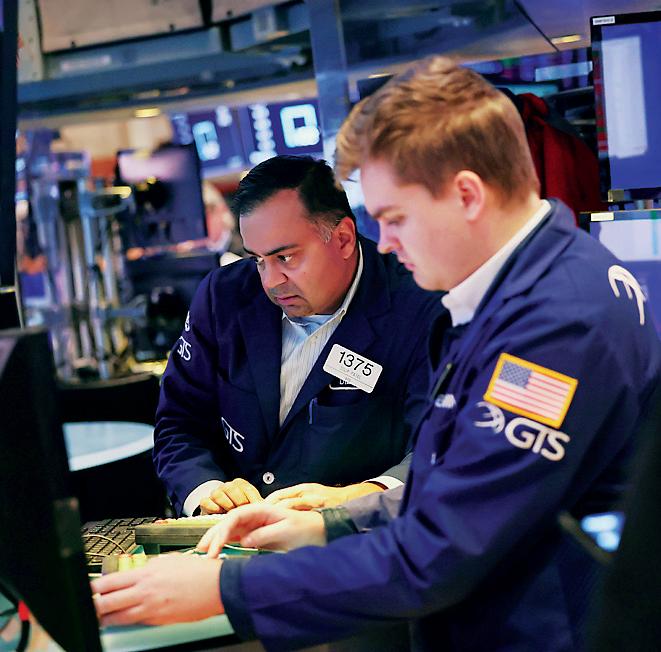
4 minute read
CCP Threat
THOMAS MCARDLE was a White House speechwriter for President George W. Bush and writes for IssuesInsights.com. Thomas McArdle
TikTok’s Threat
Cyberspace is where CCP wages a subtle, lengthy war against the US
Things were a lot simpler when we were fighting the Redcoats nearly 2 1/2 centuries ago. Before he famously rode into history in the midnight hour, alerting Colonial militia of the approach of British troops, Paul Revere arranged for Boston’s North Church to use lanterns in its steeple to signal to colonists which route the British were taking in their invasion—“One if by land, two if by sea.”
Cyberspace, rather than the land or the water, is the battleground upon which communist China is waging a subtle, sophisticated long war against the United States and the rest of the free world. Instead of hearing the warning that “the British are coming,” Americans were told earlier this month by the director of the FBI that the Chinese not only had already arrived but had placed their personal information, computer, and smartphone capability at risk.
FBI Christopher Wray warned the House Homeland Security Committee that “the Chinese government could use” the China-owned social media app TikTok, geared for sharing homemade videos, now a billion users strong and especially favored by teens, “to control data collection on millions of users or control the recommendation algorithm, which could be used for influence operations if they so chose or to control software on millions of devices, which gives it an opportunity to potentially technically compromise personal devices.” In 2019, Tiktok became the second-most downloaded app in the United States on Apple’s App Store. TikTok is owned by ByteDance, a Beijing-based internet giant.
After repeatedly assuring lawmakers that it was prioritizing the security of data that TikTok collects, the firm admitted in a June letter to members of Congress that TikTok “employees outside the U.S., including China-based employees, can have access to TikTok U.S. user data,” albeit subject to the company’s security protocols. TikTok also noted that American users’ information is stored not only in the United States but in Singapore, “the backup data storage location for our U.S. user data,” and that “ByteDance engineers around the world may assist in developing” TikTok’s algorithms.
Be all that as it may, Beijing has a series of laws in place that give the Chinese Communist Party vast control over all companies with a presence within its borders, should it wish to exercise those powers. Among them are the Counter Espionage Law of 2014; the National Security Law and the Counter-Terrorism Law, both of 2015; the Cybersecurity Law of 2016; the National Intelligence Law of 2017; the Encryption Law of 2019; and the Data Security Law enacted a year ago.
All of these statutes compel businesses operating within the People’s Republic of China (PRC) or doing business with a company operating within the PRC to share data with Chinese authorities on demand. That means unlimited access for the Chinese Communist Party to company records, contracts, intellectual property, a firm’s internally discussed strategies, and its employees’ and customers’ personal data. What’s more, the Counter Espionage Law, the National Intelligence Law, and the Cybersecurity Law actually give Beijing security and intelligence personnel license to invade business facilities in person, peruse records and data, question employees, and seize equipment. The Cybersecurity Law and the Encryption Law empower the government to conduct security audits that require the disclosure of source code.
Last year, Forbes revealed that the government of deep blue New York state expended nearly $15 million on Lenovo computers, systems, and IT services, and more than $13 million on Lexmark printers and services. Both Chinese government-owned companies are restricted by U.S. military and intelligence agencies after finding that their products could be used for surveillance, espionage, or even sabotage.
As long ago as 2006, the State Department red-flagged Lenovo products and banned their use for the transfer of classified material, such as in networks connecting U.S. embassies and consulates. In 2019, President Trump declared a national emergency and empowered his Secretary of Commerce to block technology transactions associated with Chinese global 5G telecom giant Huawei, which operates in more than 170 countries.
As the Trump White House’s 2020 “U.S. Strategic Approach to the People’s Republic of China” states, “Beijing’s Military-Civil Fusion (MCF) strategy gives the People’s Liberation Army unfettered access into civil entities developing and acquiring advanced technologies, including state-owned and private firms, universities, and research programs.”
For Americans to assist in that acquisition unwittingly via a TikTok app on their phones or the hardware within their Lenovo computers (the company that makes Motorola phones)—posing a grave risk to their freedoms—is madness.
Allowing a hidden technological war to be waged against us must stop immediately.










